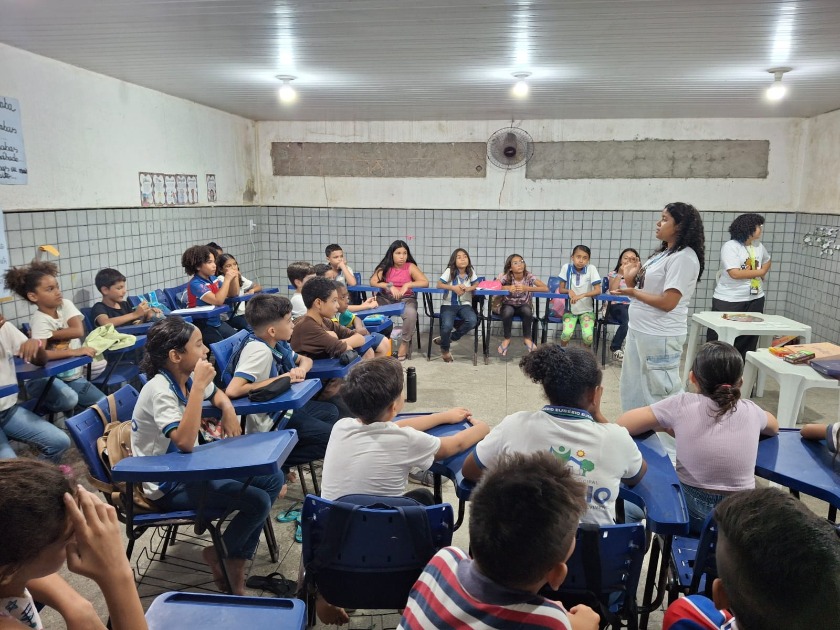 Photo propaganda
Photo propaganda
Fiocruz Ceará will participate in the 21st National Science and Technology Week (SNCT). The theme of this edition is “Brazil’s Biomes: Diversity, Knowledge and Social Technologies”. This is the largest scientific publishing event in Brazil and brings together initiatives across the country, including schools, universities and scientific institutions. This year, SNCT aims to highlight Brazil’s rich biodiversity and the traditional knowledge of its biomes, while exploring the role of social technologies in sustainable development.
Fiocruz Ceará will implement activities in the municipalities of Eusebio, Monsignor Tabosa and Santa Quitria, addressing the topics of environmental conservation and grassroots health monitoring, with resources from the Ministry of Science, Technology and Innovation (MCTI).

In Eusebio, the SNCT program began on October 8 with a pre-SNCT activity entitled “Oficina Meninas na Ciência” with primary school students from Escola de Educação Infantil e Ensino Fundamental Elisbão Pio.
On October 21, in Eusebio, activities begin with students of the Second Primary School from the Escola de Educação Infantil e Ensino Fundamental Paulo Sá and the communities surrounding the APA in Lagoa da Precabura, with a conversation about the biomes and fauna of Lagoa da Precabura, followed by a discussion of a guided drone flight Pilot over Lagoa da Bricapura. In the following days, visual communication workshops to build educational banners and a march focusing on environmental education will be held through the streets of Bricapura and the APA grounds in Lagoa da Bricapura to promote environmental learning. On October 29, there will also be an exchange between students of Manuel Ferreira da Silva Full-Time Secondary School (Eusebio) and João Climaco d’Almeida Unity State School (Piawi).
In November, the proceedings move to Monseñor Tabosa, in Aldea Mundo Novo (November 12), and to the settlement of Morenhos, in Santa Quitria (November 13), where students from the Escola Povo Caseteiro (Aldea Mundo Novo) Municipal School of Primary Education are present. . Luiz Menezes Pimentel (Asentamento Morenhos), Municipal School of Primary Education Abilio Mesquita Martins (Asentamento Alegre Tatajuba) and local residents will participate in dialogue exhibitions and workshops of social mapping, a methodology that values participatory mapping of elements that enhance and threaten the health and life of communities and the Caatinga bioregion. These activities are complemented by techniques for collecting soil and vegetation samples, as well as the use of drones for epidemiological surveillance, with the aim of detecting environmental changes and monitoring the presence of diseases in local fauna.
“These activities reflect Fiocruz Ceará’s commitment to a citizen science approach that recognizes and values communities’ knowledge and participation in the co-construction of knowledge. Social mapping and environmental mapping using drones not only provides a detailed view of the territory and the natural environment, but also strengthens the bond between students and residents with the areas they They live and work in and between communities, in addition to stimulating investigation, critical thinking through problematic realities and topics of interest to students and community residents. Thus, Fiocruz seeks to appreciate and preserve the vibrant Caatinga region, promoting active learning that aims, in addition to being educational, to contribute to the strengthening of independence. Local people in defense of their natural, social, environmental and cultural wealth, researcher from Fiocruz Ceará.
Another highlight is the Girls in Science workshop, which provides a space to reflect on equity in science and the impact of the contributions of female scientists. The conversation circle showcases the trajectories of female, Black, and Indigenous figures, encouraging young participants to see themselves as agents of knowledge and be inspired by these stories of impact. This activity seeks to value inclusive and accessible science, which recognizes Brazil’s cultural and environmental diversity and the essential role of communities in building this knowledge.
“SNCT programming in Fiocruz Ceará, in addition to promoting discussion of topics relevant to society and from a scientific point of view, provides a practical and accessible experience for the public, combining technology, education and culture. Through an approach that uses participatory methodologies, the initiative seeks to promote the protection of areas, encourage Teachers, students and community members apply this knowledge in their daily lives. In this way, the activities carried out extend beyond the event, encouraging the sustainability of the Brazilian biomes and promoting a continuous connection with the environment,” concluded Ana Claudia.
service
21st National Science and Technology Week (SNCT)
Topic: Biomes of Brazil: Diversity, Knowledge and Social Technologies
Dates:
• Eusebio: from October 21 to 26, and November 29, 2024
• Monsignor Tabousa: November 12, 2024
• Santa Quiteria: November 13, 2024
News you distributed salanoticia.com.br. The platform and the vehicle are not responsible for the published content, which is what the author assumes:
Camila Pontes de Albuquerque
[email protected]



![[VÍDEO] Elton John’s final show in the UK has the crowd moving](https://www.lodivalleynews.com/wp-content/uploads/2023/06/Elton-John-1-690x600.jpg)

More Stories
The Director of Ibict receives the Coordinator of CESU-PI – Brazilian Institute for Information in Science and Technology
A doctor who spreads fake news about breast cancer is registered with the CRM of Minas
The program offers scholarships to women in the field of science and technology